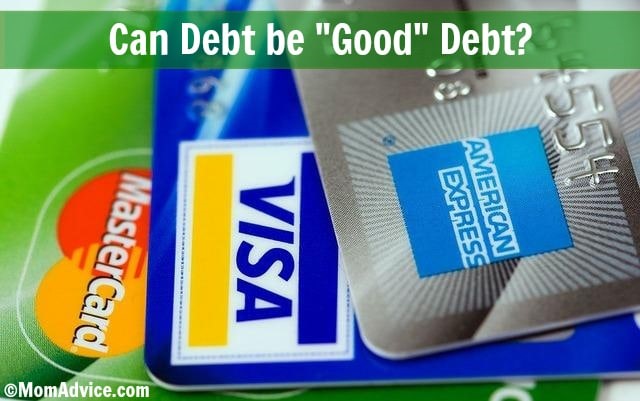From our money & finance contributor, Kelly Whalen.
Debt is a four letter word for many of us. We don’t want to carry debt. We don’t want to owe money to anyone. We work hard to eliminate debt and keep ourselves from going into debt through careful spending and strategic saving. But is there ever a time when debt is good? Can it help us meet our goals?

Mortgage Debt
While it would be lovely to buy a home outright, for most of us a little mortgage debt is necessary. Mortgage debt can be considered ‘good’ debt since the mortgage interest is tax deductible, mortgages allow you to settle into a home (and community) for a long period of time, and it offers you a stable monthly payment for your housing.
In the boom of the 2000s when mortgages were cheap and houses were expensive everyone was buying a house whether it made financial sense or not. Now the market has stabilized somewhat and in many housing markets it’s a great time to buy. You can find a home for much cheaper than you can rent in the same community. In addition, you may be able to build value by buying a home that has been foreclosed or needs some TLC.
Already own a home? Consider that debt to be a stable ‘rent’ you’re paying each month. You’ll get to live ‘rent’ free once your mortgage is paid off allowing for a lot more flexibility than an actual rental home.
If your home is underwater or you owe near what it’s worth consider your options when it comes to housing. Could you refinance and save on monthly payments? Could you pay it off faster with a shorter term mortgage? Would a short sale make sense for you financially? In some cases it may still be cheaper to stay in your home than move and pay for a rental home.
Education Debt
Americans owe over a trillion dollars in student loan debt, and student loan debt now tops all other forms of debt. While there is a cautionary tale here about not going too deeply into debt for your education, there are times when student loan debt is ‘good’ debt.
Education debt can be a smart financial move if you want to go into certain careers like becoming a doctor or lawyer. Mastering certain skills may require higher eduction as well. In addition some careers or jobs benefit from the networking that happens on a college campus.
Beyond college-aged kids though, there are other reasons you may go back to school as an older student. You may have had a life issue interrupt your schooling at the typical college age, or you may go back to school for a higher degree like a Master’s in Education. In these cases you may get some help from your employer to cover school costs or qualify for different grants and scholarships than younger students.
Earning a degree may be expensive but if it allows you to improve your income and offers you more stability in your career, then the benefit can outweigh the costs.
Car Debt
In most cases automobile loans are ‘bad’ debt, but in some cases a reliable car is a necessity and can help you earn a better income. If your job relies on a car, then having a set of wheels and good insurance is key to maintaining that job. In many suburban areas a lack of public transportation, reasonable transportation options, or safe walking and biking lanes can keep you from commuting to your job via an alternative method (you can read more about saving with these alternative methods of transportation here).
While saving and paying cash for a car is ideal, in some cases taking on car debt instead of spending all your savings may make sense. Just be sure when you’re weighing the cost of a new or newer used car versus something you can buy outright you take into account the maintenance needed or cost to own.
Other Debt
When you’re weighing whether debt is ‘good or ‘bad’ you need to take into account four things:
- Is your current debt-to-income ratio less than 35% (at the high end) or 25% (a more conservative balance)?
- Will the debt increase your earnings or earning potential?—Earning more can make a big impact on your bottom line.
- Is the reason you’re adding debt a need? Or a want?—Can you find a reasonably less expensive alternative?
- Are there other options that are less expensive but still provide what you need?—Would a local college give the same experience as an expensive university?
Do you think there is such a thing as good debt and bad debt? What do you consider to be ‘good’ debt?
Pin It